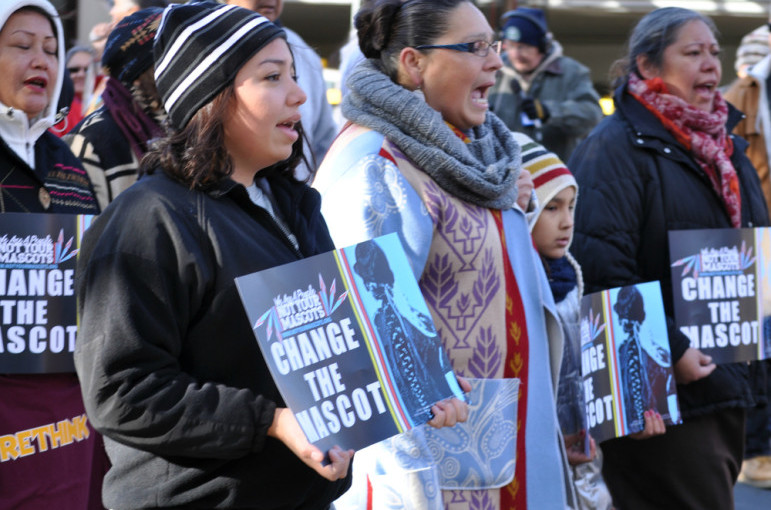Dan Snyder’s all-but-in-your-face foundation to bribe the sympathies of Native Americans (“bribery” the term of art used by Senator Harry Reid to describe Snyder’s efforts) may not be putting any information on its website or responding to NPQ’s requests for updated information on the foundation, but it seems to be trying to pave the way for Snyder’s persistence with a racial epithet as the name of his Washington, D.C. NFL franchise.
In the Washington Post this past weekend, John Woodrow Cox and Michael S. Rosenwald authored a fascinating investigative piece on the dynamics behind the acceptance and then rejection of a grant from Snyder’s Original American Foundation to the volunteer-led and financially troubled Indian National Finals Rodeo. Last year, the Rodeo accepted $200,000 from the Snyder grantmaking entity, but this year spurned the money. The Post story contrasts two versions of what happened, the contention of the Snyder people that the Oneida Indian Nation basically offered a quid pro quo for the Rodeo to spurn the tainted Snyder money versus the argument of the Oneida spokespersons that they neither offered nor consummated a monetary transaction with the financially strapped rodeo.
The official statement from the Rodeo’s vice president, Michael “Bo” Vocu, stresses its rejection of Original Americans Foundation money based on principles, not alternative funding sources: In a letter to the foundation, Vocu wrote:
After much soul searching, we have decided that we cannot in good conscience accept resources from you on the terms you have offered, no matter how desperately we need it. That is because, as you know, the resources you are offering are not truly philanthropic—they come with the expectation that we will support the racial slur that continues to promote your associated professional football team’s name…That expectation is explicit: the organization offering the resources, the Washington Redskins Original Americans Foundation, was deliberately named to invoke this slur and to ultimately make legitimizing that slur the consequence of accepting the foundation’s support.
Cox and Rosenwald suggest a more complicated picture of interactions between rodeo officials and Oneida Nation representatives. Oneida Nation spokesperson Joel Barkin acknowledged that he helped the Rodeo with its messaging, explaining its reversal on taking money from the Original Americans Foundation, but denied to the Post that there was any truth to the idea of a financial arrangement between the Oneidas and the rodeo.
Regardless of whatever the Rodeo officials might have thought the Oneida Nation representatives told them, the relationship of the rodeo to Snyder’s philanthropic interests was built at least in part on the Rodeo’s difficult fiscal straits. Apparently, the Rodeo filed for bankruptcy in 2010. From its financials posted on GuideStar Premium, the rodeo’s fund balance shrunk from $18,061 at the end of 2009 to a negative $130,092 at the end of 2012, though improving slightly to a negative $116,654 at the end of the following year. Its 990s showed growing operating losses in 2010, 2011, and 2012, including an operating loss of $133,621 on total revenues of $1,182,894 in 2012. INFR’s shaky finances are evident in a 2011 case in which one of the rodeo’s debtors, the Apache Gold Casino Resort, alleged that the rodeo filed for bankruptcy in bad faith. To survive, the rodeo regularly sought sponsorships or exchanged debt for sponsorship.
Riding into the rodeo’s fiscal breach, so to speak, was the Original Americans Foundation, offering money in 2014 and, apparently, in 2015. The financial vulnerability of the rodeo and, as evidenced in the rodeo’s bankruptcy filings, its less-than-sophisticated financial operations made it an attractive candidate for the Snyder money. As we have reported before, the Original Americans Foundation webpage has no new information—other than celebrations of the victories, few as they may be, of the football team—since March of 2014. The website contains no financial information, no list of board members, nothing pertaining to the foundation other than a letter from Snyder and a mission statement pledging that the foundation “will work as partners [with Tribal communities] to tackle the troubling realities facing so many tribes across our country…[and with] the national platform of professional sports organizations and their partners to address the challenges in the daily lives of Native Americans based on what Tribal leaders tell us they need most.”
Harry Reid is the senior senator from Nevada. The Rodeo moved its annual show to Las Vegas, according to the bankruptcy case, partly because of higher attendance and the ability of the tribes to reserve blocks of hotel rooms for members who might want to attend the event. “Bribery” is a tough word, but the Nevada connection hints at knowledge that Reid has about the Snyder operation looking for easy marks in the state. A five-figure grant from the Snyder foundation must be very attractive to an entity that even in good years barely breaks even. Given the quid pro quo described in Vocu’s letter, that’s not good philanthropy practice. Neither is not posting any information for the public about the governance and operations of the Original American Foundation. Whatever value someone might be able to find in the Snyder inducements, this operation doesn’t count as philanthropy and should be roundly examined by philanthropic trade associations concerned about the credibility and probity of the sector.—Rick Cohen







